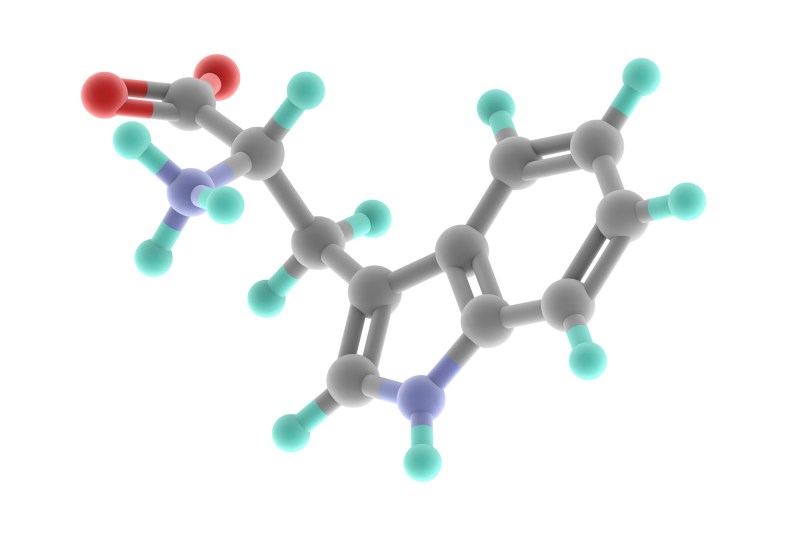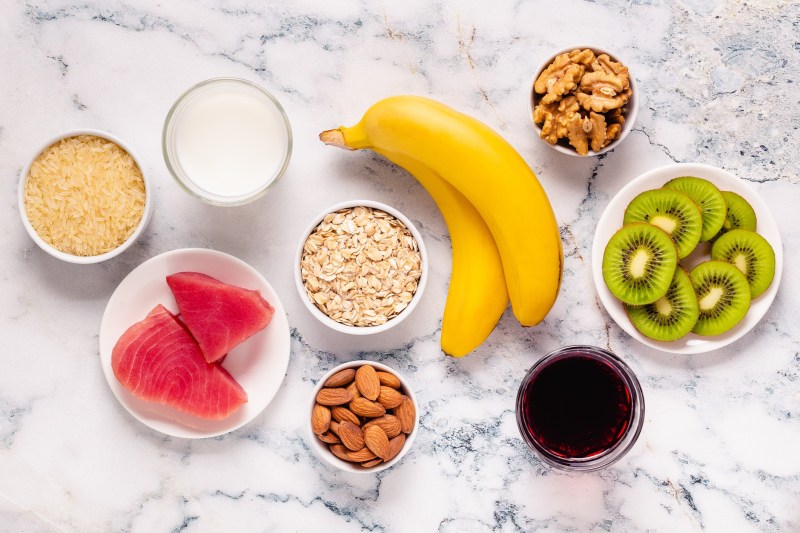
Whether you’re on the dark meat or white meat side of the debate, if you’ve ever found yourself struggling to keep your eyes open while the conversation around the Thanksgiving table stretches long into the evening, you’re probably familiar with the sleepiness that can ensue from a big plate of roasted turkey. It’s not just fatigue from holiday travel or preparing a big meal—turkey is actually rich in a specific amino acid called tryptophan. Tryptophan foods can cause sleepiness and leave you feeling ready for a post-meal nap.
But what exactly is tryptophan and how does it work? And is turkey the only food that contains tryptophan? Keep scrolling to learn more about the mysterious, sleepy amino acid: tryptophan.
What Is Tryptophan?

Our bodies break down all proteins found in food into 20 different amino acids, whether the protein comes from meat, beans, dairy, eggs, fish, vegetables, etc. These amino acids are considered the building blocks of protein, meaning that our bodies use amino acids to manufacture all the various structural and functional proteins in the body. Much like letters in the alphabet, by stringing together different combinations of these amino acids “letters,” our bodies are able to make the hundreds of different combinations of amino acids that constitute the wide variety of proteins we need to function.
While we often just think of proteins forming structures like our muscles, they are involved in nearly every structure and function of the body in some way, from forming DNA to producing energy, to creating neurotransmitters to fueling white blood cells.
Tryptophan is one of the 20 amino acids used by the human body to build proteins and carry out key physiological functions. It is an essential amino acid, which means that the body cannot synthesize it; it must be consumed in the diet. Studies have found that tryptophan is involved in the production of niacin, a B vitamin, and tryptophan can be converted into 5-hydroxytryptophan (5-HTP), a molecule used to synthesize serotonin—a neurotransmitter involved in mood and sleep—and melatonin, a hormone involved in regulating circadian rhythms and promoting sleep.
How Does Tryptophan Impact Sleep?
Studies have shown that increasing levels of tryptophan increase serotonin and melatonin and improve sleep. Because serotonin can reduce anxiety and melatonin can help regulate sleep-wake cycles, consuming tryptophan may promote sleepiness.
Foods High In Tryptophan

While turkey may be the poster child for food sources of tryptophan, there are plenty of other foods high in tryptophan. As tryptophan is an amino acid, most tryptophan-rich foods are proteins.
- Milk
- Poultry
- Pork
- Salmon
- Shrimp
- Crab
- Yogurt
- Cheese
- Oatmeal
- Tofu and Edamame
- Eggs
- Squash and Pumpkin Seeds
- Peanut Butter
- Sweet Potatoes
- Lean Beef
How Much Tryptophan Do You Need?
The recommended daily intake of tryptophan is 4 mg per kilogram of body weight. For example, someone weighing 85 kg (187 pounds) should aim for 340 mg of tryptophan per day.
Low levels of tryptophan have been linked to depression and low mood, aggressive behavior, learning and memory impairment, and sleep disturbances. These outcomes are attributed to reduced levels of serotonin and melatonin due to a paucity of 5-HTP. In other words, when levels of tryptophan are low, not enough tryptophan is available to be converted to 5-HTP, which then means that not enough serotonin and melatonin are produced.



